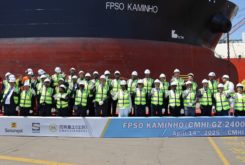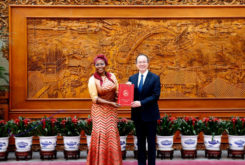For a country eagerly promoting itself abroad as an investment destination, Angola suffered a significant embarrassment with a disruption of fuel supply in the beginning of May.
More than that, the episode, which led to the firing of the CEO of the national oil company, Sonangol, in amidst a deep reform of the oil sector, also unearthed divisions within the ruling elite, in the country´s most profitable and strategic sector.
Taking the burden of responsibility for the fuel outage, Sonangol CEO Carlos Saturnino was fired, along with other members of the board of the oil company, by president João Lourenço.
The exoneration came at a crucial time for the oil sector reform, the creation of the new National Petroleum, Gas and Biofuels Agency (ANPG), which took over the role of concessionaire of oil activities, previously assigned to Sonangol.
Created by Presidential Decree (48/19, of February 06), ANPG began to regulate, supervise and promote the execution of oil, gas and biofuel activities, formally on April 18. The legal framework for the effective exercise of the concessionaire function was concluded with the publication of Law 5/19, which amends the Law on Petroleum Activities (10/04).
Our sources tell us the creation of ANPG strained Saturnino´s relations with the Oil Minister, Diamantino Azevedo: the former CEO was supportive of the lobby of the main foreign oil companies operating in Angola against Azevedo´s intention to transfer, at this stage, Sonangol´s competencies to the new agency.
Another opponent of the “timing” chosen by Azevedo to create the ANPG, at a time when the country is struggling to stop the oil production fall – currently at 1.4 million barrels per day, 200 thousand barrels less than the level of production just two years ago, and forecast to fall to around 1.2 million barrels in the next few years – was Manuel Vicente – of whom, incidentally, Saturnino was close.
In addition to the “oil majors” in Angola, the timing of the creation of ANPG also raised reservations among service providers to the oil industry, who feared that the process of transfer of competencies would lead to delays and lack of definition in the licensing process – at a time when new investments are urgent, to stem the fall in production.
For the decision of the ANPG´s immediate creation mainly weighed recommendations from the International Monetary Fund (IMF), which is currently assisting Angola technically and financially, under an EFF program.
The inauguration of the functions of the ANPG’s president, Paulino Jerónimo (former Secretary of State for Petroleum), along with the way in which Saturnino´s positions were not taken into account, and the understanding of Azevedo – closer to the president – that the process was to begin immediately prevailed, were a disavowal and consequent weakening of Saturnino.
Even prior to the fuel shortage, Saturnino´s name was cited in close circles of the Government, as being among executives of public companies and government to be ousted following the next MPLA Congress, scheduled for June 15, after which a reinforcement is expected of Lourenço´s support nucleus within the party’s umbrella bodies.
The justification for his replacement, according to the same sources, would be linked to his difficult relationship with Azevedo, which believed that Saturnino was creating obstacles to the installation of the new agency, and candidates for Saturnino´s were already taking position.
During the fuel supply disruption, the lack of support to Saturnino at Government level was visible, and was decisive for the burden of the crisis falling on him, according to our sources.
After the breach had worsened since the beginning of May, Sonangol issued a statement referring responsibility for the situation to the National Bank of Angola – lack of foreign exchange to cover imports – to debts of national industrial clients, and, in a more general way, to infrastructure problems.
To the supply disruption, which in Luanda caused waiting queues at the filling stations of up to 4-8 hours, also contributed the current reduction of the activity of the Luanda refinery, due to the ongoing works for maintenance and increase of capacity, undertaken by ENI, with the installation of a new refining unit for gasoline. Reduced availability forced the need to increase imports.
The arguments used by Sonangol helped to intensify the tension in the Presidency, including the president himself, in relation to the crisis, leading to the convening of an emergency meeting for May 07.
At the meeting called by the PR, the main argument invoked by Saturnino was rebutted by the governor of the BNA, José Lima Massano, who said that in the last BNA auction of foreign exchange the amount offered to the banks had not been fully tendered. In fact, in the May 2nd auction, only c. USD 300 million were tendered, out of USD 400 million made available to the banks. According to sources consulted, the lack of support of Saturnino was obvious at the meeting, with responsibility for the situation falling upon him.
The financial difficulties of Sonangol and the unavailability of foreign exchange had already caused similar situations of rupture, in Luanda and elsewhere in the country, due to late payments. But this time was particularly embarrassing, because of several statements made by Saturnino and the oil minister about the “turnaround” of the company, from what they classified as the disastrous management of former CEO Isabel dos Santos.
The latest disruption was resolved after May 7th, with payment being made to suppliers, and two tankers loaded with fuels that were anchored off Luanda receiving instructions to unload.https://govinfohub.gcs.gov.mo/hub/app/
Because of the tensions prior to the crisis, oil sources believe that the crisis could have been set up inside the oil company, with the specific aim of forcing Saturnino´s exit (i.e., the information that was being passed to him, from within the company, about the source of the problem did not correspond to the truth of facts). This suspicion is heightened by the fact that his successor – Sebastião Pai Querido Martins – had in the previous board of directors the department of Distribution and Logistics, whose efficiency was called into question in Sonangol´s initial statement, prior to the meeting at the Presidency. In the only and short statement to the press after his firing, CS said he was “naïve.
For the choice of Martins, an unremarkable executive of Sonangol, Azevedo´s support was decisive. The fact that he has a small influence in the sector strengthens the oil minister´s control on the oil reform process, including the creation of ANPG.
In international business circles, the episode, along with the recent abort of the tender of the 4th license for a mobile operator, is considered negative for the reformist image Lourenço was acquiring, and in particular for the ongoing effort of capturing international investment necessary for the diversification of the country’s economy – an absolute necessity to make it less dependent on oil. CLBrief)



